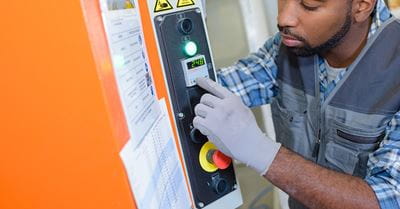Vertical Reciprocating Conveyors | Nogales

Raymond West supplies warehouse automation equipment such as VRC's.
We are among the largest suppliers of warehouse automation equipment in the state.
Call us today at (520) 281-4125
What Is a Vertical Reciprocating Conveyor (VRC)?
A VRC is a safe, relatively inexpensive, convenient means to transport goods from one elevation to another. VRCs have use case scenarios in many different industries, including manufacturing plants, warehouses, distribution centers, and other multi-level facilities. These adaptable pieces of equipment can be readily integrated with a building’s mezzanine, balcony, basement or any higher story levels.
VRC’s consist of a shaft, a carriage, and a hydraulic or mechanical system. Vertical material lifts can be added just about anywhere on the interior or exterior of a structure. Gates and enclosures encircling VRC shafts keep workers safe and prevent accidents.
What Are Some Advantages of VRCs?
Safety: Many facilities are dependent upon forklifts for vertical movement of products. Although highly capable machines, forklifts are primarily designed for the horizontal transport of materials. To save time and effort, employees may sometimes take their lift trucks beyond their height limit or move loads beyond their truck’s capacity rating. When such infractions occur, the probability of an accident multiply.
For some vertical product movement, VRCs provide a safe and effective alternative to forklifts. Specifically designed and manufactured for each operation’s application demands, VRCs substantially reduce the chances of human error.
Additionally, VRCs are designed to lift larger loads on a more frequent basis. These faster throughput rates mean less labor hours and lower costs. For businesses that have high volume vertical transport demands, vertical reciprocating conveyors can improve worker safety and lower labor expenses.
Customization: One significant advantage of vertical reciprocating conveyors is the extent to which they can be tailored to specific applications. Since passenger elevators are engineered to safely move people, there are numerous regulations that constrain the weight capacity, speed and size of these mechanisms. While such regulations are appropriate for safely transporting people, they are prohibitive for high volume movement of products in production facilities, warehouses and distribution centers. Vertical lifts can be readily customized due to the fact that they are not saddled with the same laws as passenger lifts.
Regulation: VRCs are engineered to move materials only, while standard elevators are meant to move both humans and materials. Due to this elemental distinction, VRCs are exempt from the stringent elevator regulations in many states.
In place of local jurisdiction, VRCs are regulated by their own national code that is overseen by the American Society of Mechanical Engineers (ASME), one of the first standards defining organizations in the nation. More specifically, vertical reciprocating conveyors must comply with ASME’s Safety Standard for Conveyor and Related Equipment (ASME B20.1-2018). This standard defines the requirements for the fabrication, installation, operation and servicing of conveyor systems.
Raymond West Is A Full Service Supplier of Vertical Reciprocating Conveyors
If you’re in the market for a VRC, have questions or need engineering support, Raymond West can give you a hand. Our material handling professionals can help design, procure, set up and maintain a system that’s suitable for your business. Give us a call today!
Raymond West's Nogales facility serves Santa Cruz County and Pima County, including Nogales, Patagonia, Tucson, South Tucson, Marana, Oro Valley, Sahuarita and surrounding areas
Raymond West | Nogales Material Handling Equipment Supplier
480 N Mariposa Rd C
Nogales, AZ 85621
(520) 281-4125

